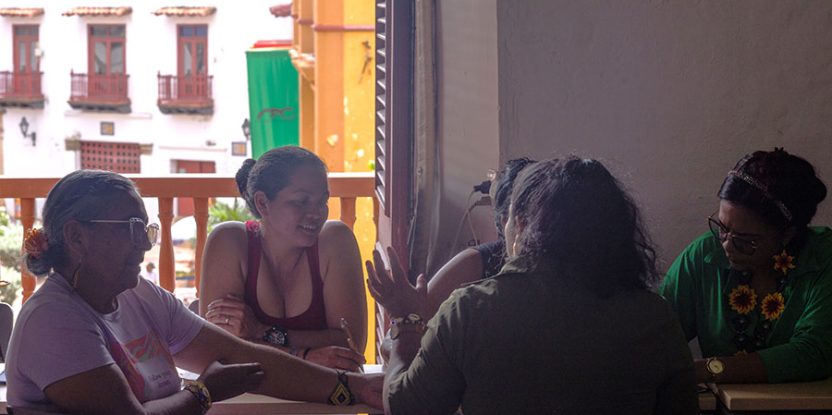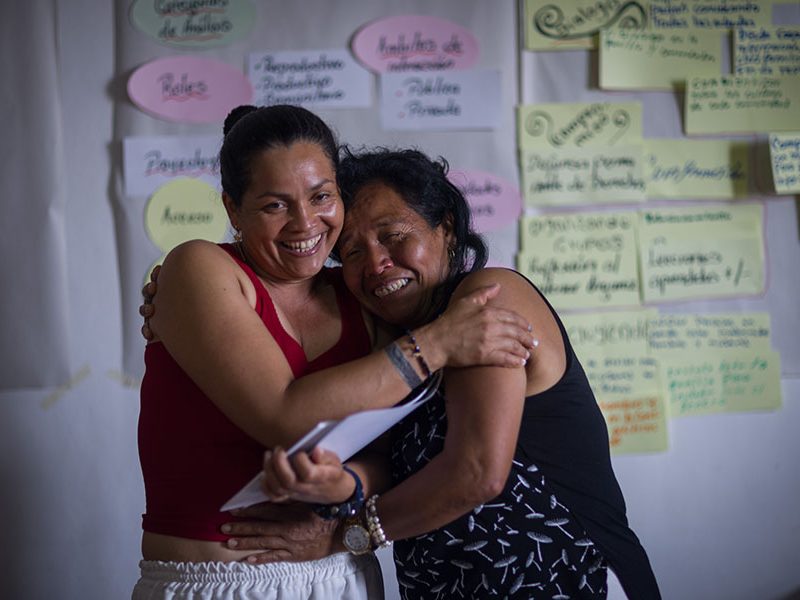
Meeting in the warm coastal city of Cartagena, a group of mainly women from Colombia’s Bolivar and Cauca departments shared challenges and opportunities, and put forward strategies for change. All of the participants were beneficiaries of ‘El Campo Emprende’, a programme to improve the economic and employment conditions of rural people in poor areas hit by the ravages of Colombia’s armed conflict.
The meeting formed part of a five-day ‘learning route’ organized by researchers at the Observatory of Ethnic Territories and Smallholder Farmers at Pontificia Universidad Javeriana de Colombia and the Center for International Forestry Research and World Agroforestry (CIFOR-ICRAF), as part of a study on securing women’s resource rights through gender transformative approaches.
“We are analyzing different cases to better understand how the El Campo Emprende rural development programme has created more equitable opportunities and relationships in beneficiary organizations, and thus identify tools that could be replicated to build stronger, more equitable and inclusive processes and organizations in the future,” explained Peter Cronkleton, a CIFOR-ICRAF senior researcher who is coordinating the study in Colombia.
While rural women are key actors in achieving the economic, environmental and social changes needed to meet the Sustainable Development Goals, the social and gender inequalities they face pose a constant challenge that limits their opportunities and thus the opportunities of their families and communities. Despite efforts, traditional gender approaches have failed to transform the social and economic realities faced by women at the pace required.
In this context, gender transformative approaches (GTAs) have emerged as a way to address the systemic factors underlying gender inequity and to promote development programme interventions that address social and gender inequities in a proactive and transformative manner.
Ongoing changes
The exchange between participants from different areas, alongside the support of the researchers, brought to the fore key factors that have fostered women’s empowerment, highlighting shifts in resource access and control, as well as social mobilization.
Participants shared how access to financing for their ventures set off new processes that allowed them not only to participate in a more equitable manner in jobs and tasks traditionally assumed by men, but also to become the leaders of the initiatives and of their communities.
“We have earned space for participation, thus strengthening women’s leadership and promoting the involvement of more women,” said Jimmis Isabel Severiche, the leader of Nueva Esperanza, an association of sesame farmers and processors in the town of Sincelejito. As a El Campo Emprende beneficiary, Severiche organized her association to move beyond cultivation to processing sesame-based products; today, this generates additional income for all of the association’s members, and Severiche is appropriately recognized as the leader driving the improvements.
In the town of Piendamó in Cauca, María Marlene Rizo set up an association to take advantage of the El Campo Emprende benefit, thus enabling her to manage a small supermarket in her community and give her life a new turn. “This experience has helped me grow as a person, empower myself and express myself,” she said. “And it has helped me pass that on to the women in my organization – and the whole community in general.”
Strategies for transformation
The event facilitated spaces for mentoring, reflection, and exchange of strategies on participants’ initiatives. “I believe that the learning route, together with the other methodological strategies that were used, placed a spotlight on transformations in access, control, and empowerment of women and young people – and why such transformations occur or not,” said Diana Lucía Maya, a professor and specialist in rural development at Universidad Javeriana, who acted as facilitator in a reflection workshop aimed at proposing GTA strategies.
“When we talk about gender, we’re not only talking about women, we’re talking about relationships, and the projects may consciously or unconsciously drive gender transformations, or simply support a differentiated group,” she said. “Along the way, these transformations begin to become visible, and we can then gain greater insight into how to work on them in the short, medium and long term.”
Based on collective learning, a greater understanding of gender relations and roles, and the sharing of individual participants’ experiences, the participants produced seven strategies to help advance GTAs:
- Fostering equitable relationships within the family and addressing gender role divisions
- Passing on knowledge: sharing the information obtained in the learning pathway with the immediate family and the community in order to expand on and take in the knowledge
- Identifying not only what should change, but also what should remain, based on spaces for reflection that help to identify and strengthen the elements that foster the organization’s success
- Involving men and women in participation processes and the construction of public policies
- Generating local knowledge and sharing it with others
- Establishing assertive communication channels at the individual, family and collective levels through awareness-raising activities, to give greater visibility to people who “have no voice”
- Motivating and promoting associative processes that foster women’s participation
All of the participants asserted their commitment to pass on the lessons learned in their groups and communities, and to help more members of their organizations to understand the need for change towards gender equity to improve the lives of all.

Learning route participants during the final workshop. Photo by Marlon del Aguila Guerrero/CIFOR-ICRAF
This is the third of a blog series covering the activities of the study Securing Women’s Resource Rights through gender transformative approaches (WRR) in Colombia.
Acknowledgements
This research is part of work on Securing Women’s Resource Rights through Gender-Transformative approaches. In 2020, the International Fund for Agricultural Development (IFAD) invited a consortium of the Center for International Forestry Research and World Agroforestry Centre (CIFOR-ICRAF), the International Food Policy Research Institute (IFPRI) and the Alliance of Bioversity International and the International Center for Tropical Agriculture (CIAT) to work with selected IFAD projects to promote and strengthen women’s land rights through the integration of gender transformative approaches (GTAs) in rural development interventions by improving policies, tools and practices.
We want you to share Forests News content, which is licensed under Creative Commons Attribution-NonCommercial-ShareAlike 4.0 International (CC BY-NC-SA 4.0). This means you are free to redistribute our material for non-commercial purposes. All we ask is that you give Forests News appropriate credit and link to the original Forests News content, indicate if changes were made, and distribute your contributions under the same Creative Commons license. You must notify Forests News if you repost, reprint or reuse our materials by contacting forestsnews@cifor-icraf.org.